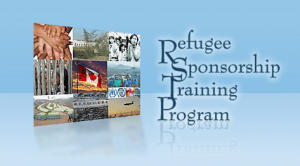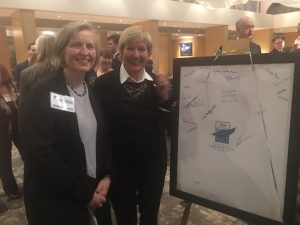Organization of the Month | February 2017
The Refugee Sponsorship Training Program (RSTP) supports groups interested in the Private Sponsorship of Refugees (PSR) Program, through which Canadian citizens and Permanent Residents can engage in the resettlement of refugees.
RSTP works with many different types of sponsoring groups: Sponsorship Agreement Holders (SAHs) and their Constituent Groups (CGs), Groups of Five, and Community Sponsors across Canada (excluding Quebec).
The increase in interest in the PSR program and involvement from the public in the resettlement of Syrian refugees that Canada has witnessed since September 2015 dramatically increased demand for RSTP services. With additional funding support, RSTP has been able to expand its staff and programs to assist sponsors across the country. For the first time, RSTP placed Trainers in Vancouver and Halifax to provide more intensive regional support.
What do we do?
RSTP addresses information and ongoing training needs of private sponsorship groups (PSGs), and the initial information needs of sponsored refugees.
RSTP provides training to sponsorship groups via:
- Webinar presentations
- Workshops
- Information sessions
- Training manuals and guides
- Online-based training courses
RSTP keeps sponsors informed about policy updates via:
- Information sessions
- E-mail distribution lists
- the RSTP Website (rstp.ca)
RSTP assists sponsors with their case-specific questions by:
- Taking inquiries by e-mail and telephone
- Providing support with case assessment and country or origin research
- Making referrals and connecting sponsors with local settlement resources
RSTP in Western Canada
The RSTP Trainer in Vancouver, BC works closely with PSGs in Alberta and British Columbia. RSTP’s activities in Western Canada include:
Workshops and Training Sessions
RSTP offers trainings and workshops to ensure that PSGs understand the requirements of the program and the level of commitment needed, assist them with preparing application packages and guide them through the sponsorship process. RSTP emphasizes post-arrival issues that private sponsors may encounter and make sure that they receive the necessary assistance with providing settlement support to sponsored refugees.
Support with case-specific inquiries
RSTP responds to e-mail and telephone inquiries from sponsorship groups in Alberta and BC requesting: assistance with completing application forms, clarification of eligibility requirements, obtaining application updates, and seeking support with finding necessary settlement resources.
Updates and Information Sharing
RSTP keeps abreast of policy developments and changes, including provincial initiatives in BC and AB, and informs sponsorship groups via an e-mail distribution list.
Networking and Outreach
RSTP takes part in community events, networking meetings, roundtable discussions, and other events that focus on refugee protection and resettlement issues.
When and how can I contact RSTP?
Please do not hesitate to contact RSTP if you:
- Are interested in learning more about Private Refugee Sponsorship program;
- Would like assistance with completing application forms;
- Have a case-specific question related to a refugee individual/family whom your group is sponsoring;
- Would like to get connected to a settlement service provider organization;
- Have questions about preparing for the long-term and ending sponsorship period; and/or
- Would like to learn about upcoming workshops, webinars, and other training events offered to private sponsorship groups.
RSTP is funded by Immigration, Refugees, and Citizenship Canada (IRCC) and administered by Catholic Crosscultural Services (CCS).
RSTP office in Ontario:
55 Town Centre Court, Suite 401 Toronto, ON M1P 4X4 Canada
E-mail: info@rstp.ca
Tel: 416.290.1700; Toll-free: 1.877.290.1701
RSTP Trainer in Western Canada:
Tel: 604.254.9626 ext. 517





